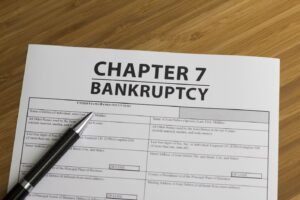
Filing for Chapter 7 bankruptcy offers a fresh financial start for many struggling with mounting debts. However, understanding which debts are wiped out and which ones remain is pivotal to planning for a debt-free future. As with all legal processes, the intricacies can often be overwhelming. This guide will break down the typical debts that can and cannot be discharged, allowing individuals to make informed decisions and navigate their financial journey with clarity.
The Most Commonly Discharged Debts
The primary benefit of Chapter 7 bankruptcy lies in the discharge of specific debts. This discharge allows individuals to eliminate certain obligations, enabling them to rebuild their financial landscape. Some of the most pressing debts that can be discharged include:
- Credit Card Debt: The ability to discharge most credit card debts in a Chapter 7 bankruptcy offers a lifeline to those seeking a fresh start. This provision provides much-needed relief, allowing for the elimination of this high-interest debt.
- Medical Bills: Unforeseen medical emergencies often push individuals towards bankruptcy, especially without adequate insurance coverage. Thankfully, Chapter 7 bankruptcy typically covers the discharge of these outstanding medical debts, offering a reprieve to those already dealing with health concerns.
- Personal Loans: Whether it’s a loan from a trusted friend, a family member, or an employer, personal loans can weigh heavily on one’s conscience and finances. Such obligations, which are often not documented or lack formal terms, can be discharged under Chapter 7.
- Utility Bills: Keeping up with utility bills can sometimes be challenging, especially during months of extreme temperatures or financial strife. Although filing for Chapter 7 won’t absolve responsibilities for ongoing services, it does offer a clean slate regarding past due utility bills.
- Past Rent Owed: Leaving a residence with outstanding rent can place former tenants in a tricky financial and legal position. However, with a Chapter 7 bankruptcy filing, individuals have the opportunity to discharge past rent owed.
Understanding what can be discharged provides clarity and helps in anticipating the financial relief that Chapter 7 can offer.
The Debts That Remain After Chapter 7
Not all debts are created equal in the eyes of bankruptcy law. Some obligations, due to their nature, remain binding even after filing for Chapter 7:
- Student Loans: The specter of student loan debt looms large for many, often persisting for decades after graduation. Under Chapter 7, these debts remain unless the filer can successfully demonstrate undue hardship, a rigorous standard that’s notably tough to satisfy.
- Tax Debt: Generally, newer federal and state income tax debts remain untouched by a Chapter 7 discharge. The specifics, such as the age and type of tax debt, play a crucial role in determining whether they can be wiped out.
- Child Support and Alimony: Prioritizing the well-being of dependents, Chapter 7 does not discharge legal obligations like child support or alimony. These debts stand as paramount, ensuring that the receiving party, often children or former spouses, continue to receive the financial support they’re entitled to.
- Debts From Fraudulent Activities: Debts accrued through deceitful means or fraudulent activities don’t find protection under Chapter 7. If it’s determined that a debt was secured under false pretenses, individuals are still held accountable for its repayment.
- Certain Types of Fines and Penalties: Not all penalties and fines can be waived with a bankruptcy declaration. Specifically, financial consequences like traffic infractions or legally mandated restitution following criminal activities remain binding.
Be aware of these ongoing obligations to avoid any surprises during the bankruptcy process.
The Benefits of Expert Guidance
Chapter 7 bankruptcy promises a route to financial freedom, but understanding which debts get erased and which remain is only the first step. For a tailored understanding and a smooth bankruptcy journey, reach out to Wiesner & Frackowiak, LC, to help guide you every step of the way.
